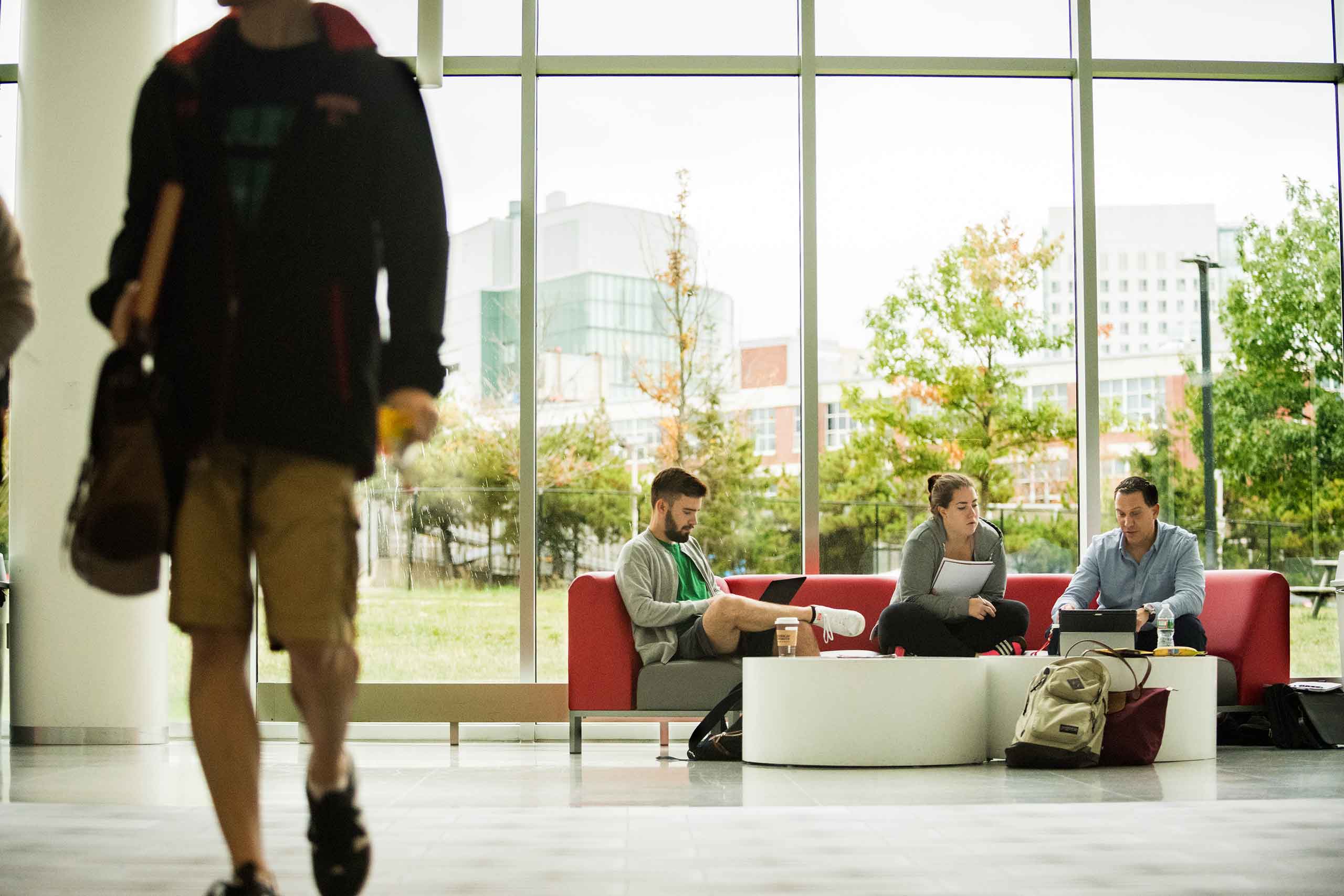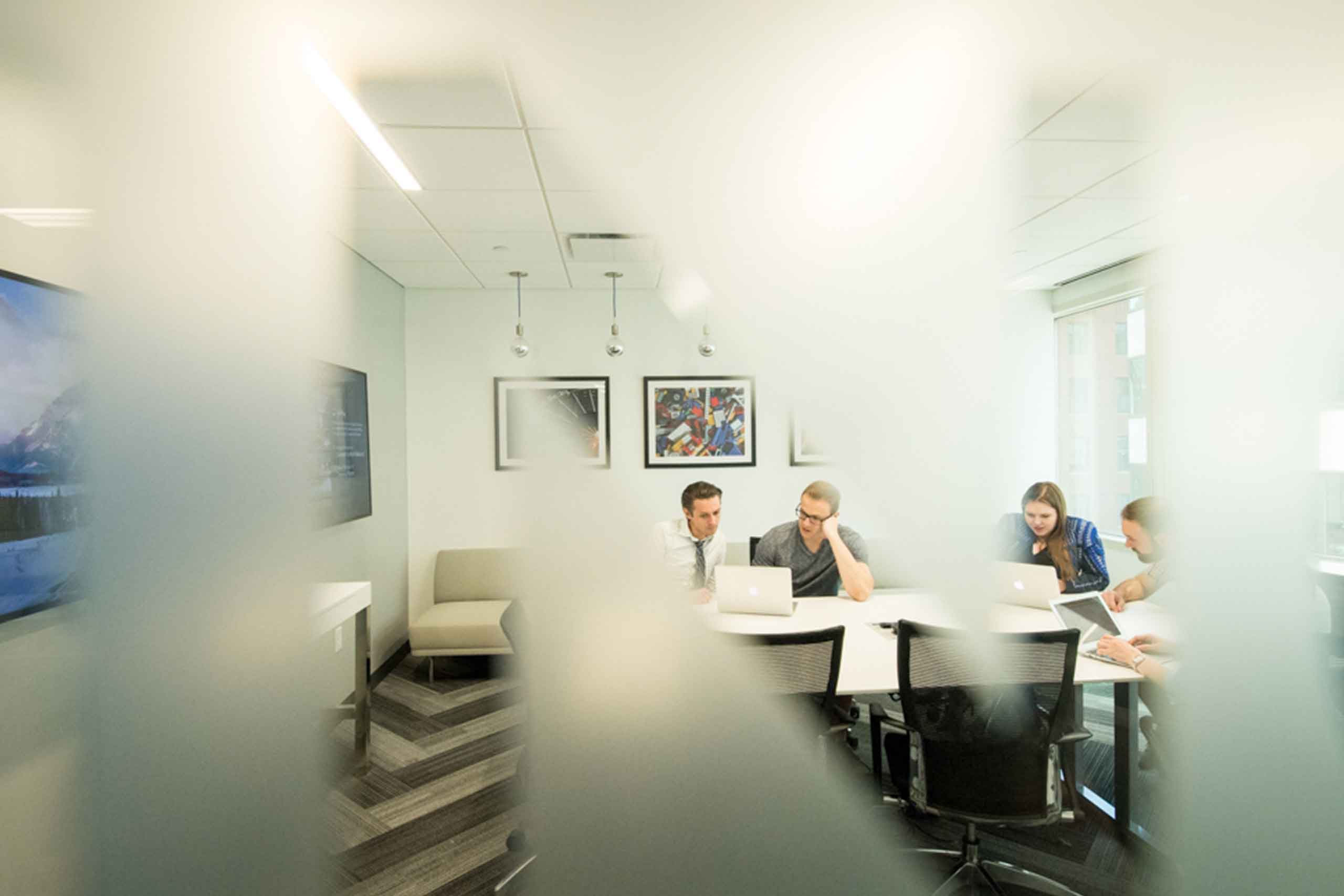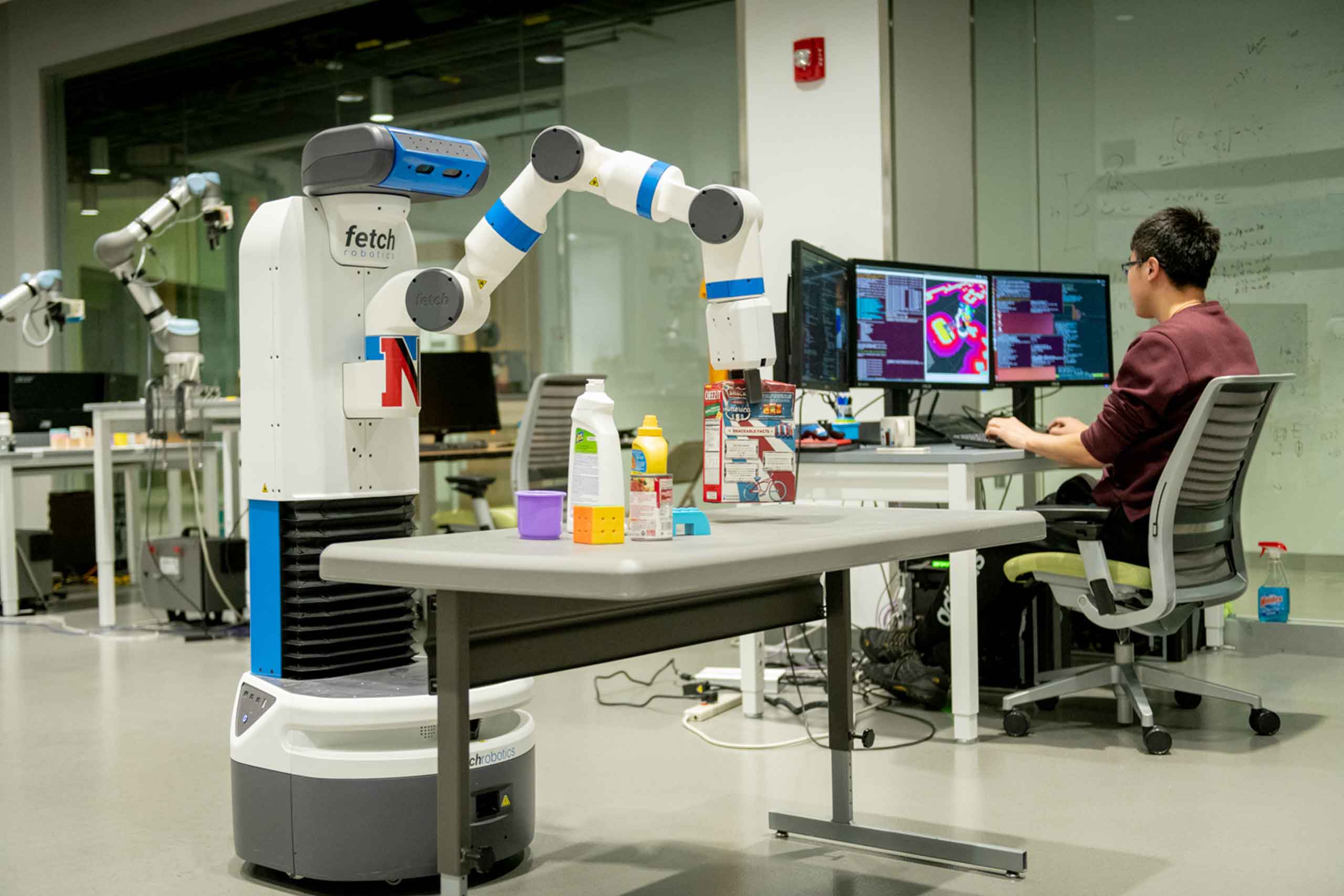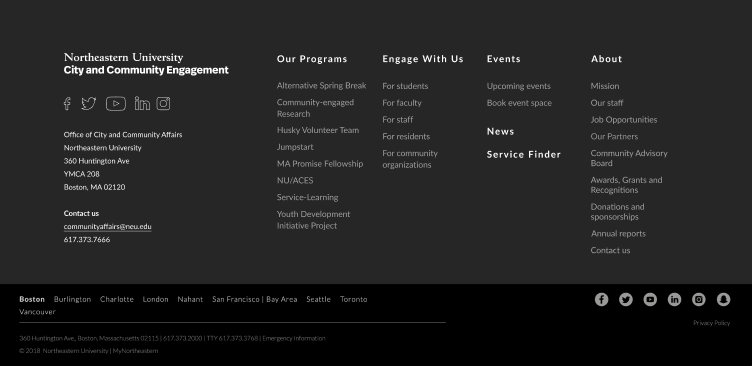

Transforming the academic experience: How Bethany Edmunds is shaping the next generation of computer scientists in Vancouver

Fri 09.17.21 / Aditi Peyush

Transforming the academic experience: How Bethany Edmunds is shaping the next generation of computer scientists in Vancouver
Fri 09.17.21 / Aditi Peyush
Fri 09.17.21 / Aditi Peyush
Fri 09.17.21 / Aditi Peyush


Transforming the academic experience: How Bethany Edmunds is shaping the next generation of computer scientists in Vancouver

Fri 09.17.21 / Aditi Peyush

Transforming the academic experience: How Bethany Edmunds is shaping the next generation of computer scientists in Vancouver
Fri 09.17.21 / Aditi Peyush
Fri 09.17.21 / Aditi Peyush
Fri 09.17.21 / Aditi Peyush
If you sit in on an “Object-Oriented Design” lecture from Lino Coria Mendoza, an associate teaching professor in Vancouver, you’ll notice that the environment differs greatly from that of a typical graduate lecture. Students interact and collaborate more with their peers than in traditional graduate classes, discussing and practicing design principles deeply and critically.
“I want my students to be doing something in the class. I don’t want to be talking for two hours,” says Coria Mendoza.
Bethany Edmunds, director of computer science at the Khoury College of Computer Sciences in Vancouver, calls this style the “student-centered learning model.” This model puts students at the heart of the learning process. Collaboration and small group discussions are encouraged, and the classroom is much more interactive. According to Sommer Harris, a graduate computer science student in Vancouver, the model “encourages students to take ownership of their own learning process.”
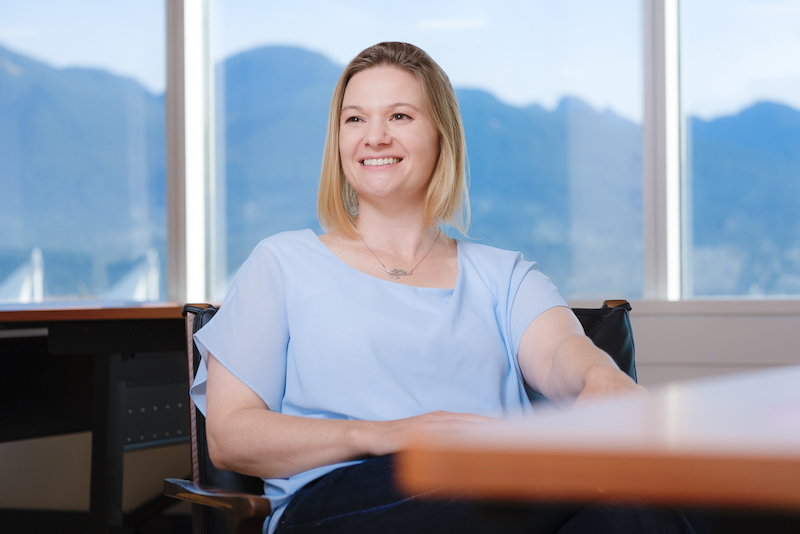 Bethany Edmunds, director of computer science at the Khoury College of Computer Sciences in Vancouver.
Bethany Edmunds, director of computer science at the Khoury College of Computer Sciences in Vancouver.Harris explains, “We are asked to understand the material before we come to class and bring any questions we have. This requires us to be actively engaged and discerning about which parts of the material are most important to focus on. I have also learned to break down questions and terms, to decipher problems in new areas in computer science that I haven’t seen before.”
Coria Mendoza emphasized the importance of practice: “If I were teaching people how to ride a bike, they would see me riding a bike, but they wouldn’t be able to learn anything from seeing that. They need to get on that bike—we need to do that.”
“Mobile Application Development,” taught by Michal Aibin, visiting associate professor, requires as much engagement as all other courses on campus. “We try to put as much theoretical content [as possible] before the class in videos and some materials that we can practice in class, which is very important from a teaching perspective,” says Michal. “You need to be flexible; you need to listen to the environment.”
Through this model, Edmunds hopes that students are getting a deeper understanding of the computer science field.
“I think one of the things that hurts computer scientists and the tech industry is that, being a field-driven from mathematics, we are programmed to think there’s one right answer. And there is one right answer from a given perspective. But I think it’s really important to look at different perspectives and question your own decisions.”
Edmunds explained that when people don’t question their decisions, others get left out and the big picture isn’t complete. “We really tried to give students a broader picture of what they’re trying to do, and it allows them to go deeper.”
This model is key in allowing students to develop the critical soft skills needed to collaborate in teams and communicate effectively. This compelled Edmunds to incorporate this model into the Khoury College Master of Science in Computer Science (MSCS) program offered in Vancouver.
Since February 2020, she’s been investing her resources into building the program with the intention of exposing students to the industry so they’re able to integrate into the workforce with ease. The learning model enables students to continuously improve their interpersonal skills, which in turn, empowers them to adapt to the demands of the industry.
“It’s really exciting, to be able to build a program from the ground up with fantastic resources out of Boston, Seattle, and Silicon Valley,” said Edmunds. “To be able to see what’s worked well on other campuses and then say ‘okay, but what does that mean and what would it look like here, knowing that it’s a slightly different environment here?’”
Part of Edmunds’ efforts include building a diverse teaching team in Vancouver. As a campus that offers the Align program, Edmunds factored features of the program—like diversity of thought and background—into her planning.
“I love the Align program, many of our regional campuses have a large Align program. But when we sought to deliver it, one of the things I thought about was, not only are we giving people with various backgrounds an opportunity to learn computer science, but it’s an opportunity for all of the people in the classroom to interact with people with different perspectives,” explained Edmunds.
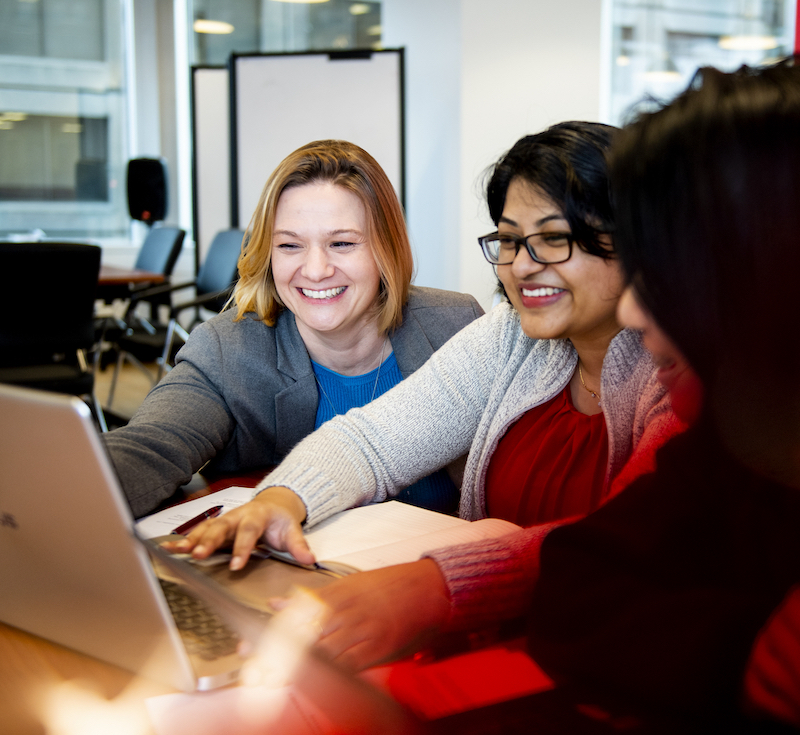 Bethany Edmunds working with students at the Northeastern Vancouver campus. Photo by Ruby Wallau/Northeastern University.
Bethany Edmunds working with students at the Northeastern Vancouver campus. Photo by Ruby Wallau/Northeastern University.However, Edmunds wasn’t just focused on diversity in the student population. Driven to include interdisciplinary voices in the classroom, the Vancouver campus introduced five new faculty members in 2021.
Edmunds explained, “I’m not hiring individuals. I’m hiring teams. Just knowing that I can learn from this person, or I can learn from that person [means that] as a team, we’re going to be so much stronger.”
As a team, the faculty collaborate to offer students the best experience possible, while drawing from their diverse backgrounds.
“There is just value in having somebody in the front of the classroom who comes from a background similar to yours. It allows somebody that comes into a program who’s not sure if it’s right for them to go and then be in a class and know that somebody else has been through this struggle before.” Edmunds continued, “One of our professors is a graduate of the Align program, another one of our professors grew up with intermittent water and electricity. So they know what it’s like to face some of the challenges our students face.”
Edmunds’ faculty selection criteria explain why Khoury College’s Vancouver teaching team is so unique. “The number one thing I look for is the understanding that their job is to be a facilitator of learning,” she explained. “Their job is not to be a gatekeeper; their job is to really understand that the student comes first.”
But Edmunds isn’t done building the program; her goal is to make it more accessible. “I don’t think that everybody has access to the opportunities that computer science brings,” she said. She’s also dedicated to transforming the field, noting “I think what we should be saying is, ‘this person with this background is valuable, and they’re bringing something valuable.’”
“To get more voices into computer science will lead to tech where the goals are more in line with society’s goals,” Edmunds concluded.
If you sit in on an “Object-Oriented Design” lecture from Lino Coria Mendoza, an associate teaching professor in Vancouver, you’ll notice that the environment differs greatly from that of a typical graduate lecture. Students interact and collaborate more with their peers than in traditional graduate classes, discussing and practicing design principles deeply and critically.
“I want my students to be doing something in the class. I don’t want to be talking for two hours,” says Coria Mendoza.
Bethany Edmunds, director of computer science at the Khoury College of Computer Sciences in Vancouver, calls this style the “student-centered learning model.” This model puts students at the heart of the learning process. Collaboration and small group discussions are encouraged, and the classroom is much more interactive. According to Sommer Harris, a graduate computer science student in Vancouver, the model “encourages students to take ownership of their own learning process.”
 Bethany Edmunds, director of computer science at the Khoury College of Computer Sciences in Vancouver.
Bethany Edmunds, director of computer science at the Khoury College of Computer Sciences in Vancouver.Harris explains, “We are asked to understand the material before we come to class and bring any questions we have. This requires us to be actively engaged and discerning about which parts of the material are most important to focus on. I have also learned to break down questions and terms, to decipher problems in new areas in computer science that I haven’t seen before.”
Coria Mendoza emphasized the importance of practice: “If I were teaching people how to ride a bike, they would see me riding a bike, but they wouldn’t be able to learn anything from seeing that. They need to get on that bike—we need to do that.”
“Mobile Application Development,” taught by Michal Aibin, visiting associate professor, requires as much engagement as all other courses on campus. “We try to put as much theoretical content [as possible] before the class in videos and some materials that we can practice in class, which is very important from a teaching perspective,” says Michal. “You need to be flexible; you need to listen to the environment.”
Through this model, Edmunds hopes that students are getting a deeper understanding of the computer science field.
“I think one of the things that hurts computer scientists and the tech industry is that, being a field-driven from mathematics, we are programmed to think there’s one right answer. And there is one right answer from a given perspective. But I think it’s really important to look at different perspectives and question your own decisions.”
Edmunds explained that when people don’t question their decisions, others get left out and the big picture isn’t complete. “We really tried to give students a broader picture of what they’re trying to do, and it allows them to go deeper.”
This model is key in allowing students to develop the critical soft skills needed to collaborate in teams and communicate effectively. This compelled Edmunds to incorporate this model into the Khoury College Master of Science in Computer Science (MSCS) program offered in Vancouver.
Since February 2020, she’s been investing her resources into building the program with the intention of exposing students to the industry so they’re able to integrate into the workforce with ease. The learning model enables students to continuously improve their interpersonal skills, which in turn, empowers them to adapt to the demands of the industry.
“It’s really exciting, to be able to build a program from the ground up with fantastic resources out of Boston, Seattle, and Silicon Valley,” said Edmunds. “To be able to see what’s worked well on other campuses and then say ‘okay, but what does that mean and what would it look like here, knowing that it’s a slightly different environment here?’”
Part of Edmunds’ efforts include building a diverse teaching team in Vancouver. As a campus that offers the Align program, Edmunds factored features of the program—like diversity of thought and background—into her planning.
“I love the Align program, many of our regional campuses have a large Align program. But when we sought to deliver it, one of the things I thought about was, not only are we giving people with various backgrounds an opportunity to learn computer science, but it’s an opportunity for all of the people in the classroom to interact with people with different perspectives,” explained Edmunds.
 Bethany Edmunds working with students at the Northeastern Vancouver campus. Photo by Ruby Wallau/Northeastern University.
Bethany Edmunds working with students at the Northeastern Vancouver campus. Photo by Ruby Wallau/Northeastern University.However, Edmunds wasn’t just focused on diversity in the student population. Driven to include interdisciplinary voices in the classroom, the Vancouver campus introduced five new faculty members in 2021.
Edmunds explained, “I’m not hiring individuals. I’m hiring teams. Just knowing that I can learn from this person, or I can learn from that person [means that] as a team, we’re going to be so much stronger.”
As a team, the faculty collaborate to offer students the best experience possible, while drawing from their diverse backgrounds.
“There is just value in having somebody in the front of the classroom who comes from a background similar to yours. It allows somebody that comes into a program who’s not sure if it’s right for them to go and then be in a class and know that somebody else has been through this struggle before.” Edmunds continued, “One of our professors is a graduate of the Align program, another one of our professors grew up with intermittent water and electricity. So they know what it’s like to face some of the challenges our students face.”
Edmunds’ faculty selection criteria explain why Khoury College’s Vancouver teaching team is so unique. “The number one thing I look for is the understanding that their job is to be a facilitator of learning,” she explained. “Their job is not to be a gatekeeper; their job is to really understand that the student comes first.”
But Edmunds isn’t done building the program; her goal is to make it more accessible. “I don’t think that everybody has access to the opportunities that computer science brings,” she said. She’s also dedicated to transforming the field, noting “I think what we should be saying is, ‘this person with this background is valuable, and they’re bringing something valuable.’”
“To get more voices into computer science will lead to tech where the goals are more in line with society’s goals,” Edmunds concluded.
If you sit in on an “Object-Oriented Design” lecture from Lino Coria Mendoza, an associate teaching professor in Vancouver, you’ll notice that the environment differs greatly from that of a typical graduate lecture. Students interact and collaborate more with their peers than in traditional graduate classes, discussing and practicing design principles deeply and critically.
“I want my students to be doing something in the class. I don’t want to be talking for two hours,” says Coria Mendoza.
Bethany Edmunds, director of computer science at the Khoury College of Computer Sciences in Vancouver, calls this style the “student-centered learning model.” This model puts students at the heart of the learning process. Collaboration and small group discussions are encouraged, and the classroom is much more interactive. According to Sommer Harris, a graduate computer science student in Vancouver, the model “encourages students to take ownership of their own learning process.”
 Bethany Edmunds, director of computer science at the Khoury College of Computer Sciences in Vancouver.
Bethany Edmunds, director of computer science at the Khoury College of Computer Sciences in Vancouver.Harris explains, “We are asked to understand the material before we come to class and bring any questions we have. This requires us to be actively engaged and discerning about which parts of the material are most important to focus on. I have also learned to break down questions and terms, to decipher problems in new areas in computer science that I haven’t seen before.”
Coria Mendoza emphasized the importance of practice: “If I were teaching people how to ride a bike, they would see me riding a bike, but they wouldn’t be able to learn anything from seeing that. They need to get on that bike—we need to do that.”
“Mobile Application Development,” taught by Michal Aibin, visiting associate professor, requires as much engagement as all other courses on campus. “We try to put as much theoretical content [as possible] before the class in videos and some materials that we can practice in class, which is very important from a teaching perspective,” says Michal. “You need to be flexible; you need to listen to the environment.”
Through this model, Edmunds hopes that students are getting a deeper understanding of the computer science field.
“I think one of the things that hurts computer scientists and the tech industry is that, being a field-driven from mathematics, we are programmed to think there’s one right answer. And there is one right answer from a given perspective. But I think it’s really important to look at different perspectives and question your own decisions.”
Edmunds explained that when people don’t question their decisions, others get left out and the big picture isn’t complete. “We really tried to give students a broader picture of what they’re trying to do, and it allows them to go deeper.”
This model is key in allowing students to develop the critical soft skills needed to collaborate in teams and communicate effectively. This compelled Edmunds to incorporate this model into the Khoury College Master of Science in Computer Science (MSCS) program offered in Vancouver.
Since February 2020, she’s been investing her resources into building the program with the intention of exposing students to the industry so they’re able to integrate into the workforce with ease. The learning model enables students to continuously improve their interpersonal skills, which in turn, empowers them to adapt to the demands of the industry.
“It’s really exciting, to be able to build a program from the ground up with fantastic resources out of Boston, Seattle, and Silicon Valley,” said Edmunds. “To be able to see what’s worked well on other campuses and then say ‘okay, but what does that mean and what would it look like here, knowing that it’s a slightly different environment here?’”
Part of Edmunds’ efforts include building a diverse teaching team in Vancouver. As a campus that offers the Align program, Edmunds factored features of the program—like diversity of thought and background—into her planning.
“I love the Align program, many of our regional campuses have a large Align program. But when we sought to deliver it, one of the things I thought about was, not only are we giving people with various backgrounds an opportunity to learn computer science, but it’s an opportunity for all of the people in the classroom to interact with people with different perspectives,” explained Edmunds.
 Bethany Edmunds working with students at the Northeastern Vancouver campus. Photo by Ruby Wallau/Northeastern University.
Bethany Edmunds working with students at the Northeastern Vancouver campus. Photo by Ruby Wallau/Northeastern University.However, Edmunds wasn’t just focused on diversity in the student population. Driven to include interdisciplinary voices in the classroom, the Vancouver campus introduced five new faculty members in 2021.
Edmunds explained, “I’m not hiring individuals. I’m hiring teams. Just knowing that I can learn from this person, or I can learn from that person [means that] as a team, we’re going to be so much stronger.”
As a team, the faculty collaborate to offer students the best experience possible, while drawing from their diverse backgrounds.
“There is just value in having somebody in the front of the classroom who comes from a background similar to yours. It allows somebody that comes into a program who’s not sure if it’s right for them to go and then be in a class and know that somebody else has been through this struggle before.” Edmunds continued, “One of our professors is a graduate of the Align program, another one of our professors grew up with intermittent water and electricity. So they know what it’s like to face some of the challenges our students face.”
Edmunds’ faculty selection criteria explain why Khoury College’s Vancouver teaching team is so unique. “The number one thing I look for is the understanding that their job is to be a facilitator of learning,” she explained. “Their job is not to be a gatekeeper; their job is to really understand that the student comes first.”
But Edmunds isn’t done building the program; her goal is to make it more accessible. “I don’t think that everybody has access to the opportunities that computer science brings,” she said. She’s also dedicated to transforming the field, noting “I think what we should be saying is, ‘this person with this background is valuable, and they’re bringing something valuable.’”
“To get more voices into computer science will lead to tech where the goals are more in line with society’s goals,” Edmunds concluded.
If you sit in on an “Object-Oriented Design” lecture from Lino Coria Mendoza, an associate teaching professor in Vancouver, you’ll notice that the environment differs greatly from that of a typical graduate lecture. Students interact and collaborate more with their peers than in traditional graduate classes, discussing and practicing design principles deeply and critically.
“I want my students to be doing something in the class. I don’t want to be talking for two hours,” says Coria Mendoza.
Bethany Edmunds, director of computer science at the Khoury College of Computer Sciences in Vancouver, calls this style the “student-centered learning model.” This model puts students at the heart of the learning process. Collaboration and small group discussions are encouraged, and the classroom is much more interactive. According to Sommer Harris, a graduate computer science student in Vancouver, the model “encourages students to take ownership of their own learning process.”
 Bethany Edmunds, director of computer science at the Khoury College of Computer Sciences in Vancouver.
Bethany Edmunds, director of computer science at the Khoury College of Computer Sciences in Vancouver.Harris explains, “We are asked to understand the material before we come to class and bring any questions we have. This requires us to be actively engaged and discerning about which parts of the material are most important to focus on. I have also learned to break down questions and terms, to decipher problems in new areas in computer science that I haven’t seen before.”
Coria Mendoza emphasized the importance of practice: “If I were teaching people how to ride a bike, they would see me riding a bike, but they wouldn’t be able to learn anything from seeing that. They need to get on that bike—we need to do that.”
“Mobile Application Development,” taught by Michal Aibin, visiting associate professor, requires as much engagement as all other courses on campus. “We try to put as much theoretical content [as possible] before the class in videos and some materials that we can practice in class, which is very important from a teaching perspective,” says Michal. “You need to be flexible; you need to listen to the environment.”
Through this model, Edmunds hopes that students are getting a deeper understanding of the computer science field.
“I think one of the things that hurts computer scientists and the tech industry is that, being a field-driven from mathematics, we are programmed to think there’s one right answer. And there is one right answer from a given perspective. But I think it’s really important to look at different perspectives and question your own decisions.”
Edmunds explained that when people don’t question their decisions, others get left out and the big picture isn’t complete. “We really tried to give students a broader picture of what they’re trying to do, and it allows them to go deeper.”
This model is key in allowing students to develop the critical soft skills needed to collaborate in teams and communicate effectively. This compelled Edmunds to incorporate this model into the Khoury College Master of Science in Computer Science (MSCS) program offered in Vancouver.
Since February 2020, she’s been investing her resources into building the program with the intention of exposing students to the industry so they’re able to integrate into the workforce with ease. The learning model enables students to continuously improve their interpersonal skills, which in turn, empowers them to adapt to the demands of the industry.
“It’s really exciting, to be able to build a program from the ground up with fantastic resources out of Boston, Seattle, and Silicon Valley,” said Edmunds. “To be able to see what’s worked well on other campuses and then say ‘okay, but what does that mean and what would it look like here, knowing that it’s a slightly different environment here?’”
Part of Edmunds’ efforts include building a diverse teaching team in Vancouver. As a campus that offers the Align program, Edmunds factored features of the program—like diversity of thought and background—into her planning.
“I love the Align program, many of our regional campuses have a large Align program. But when we sought to deliver it, one of the things I thought about was, not only are we giving people with various backgrounds an opportunity to learn computer science, but it’s an opportunity for all of the people in the classroom to interact with people with different perspectives,” explained Edmunds.
 Bethany Edmunds working with students at the Northeastern Vancouver campus. Photo by Ruby Wallau/Northeastern University.
Bethany Edmunds working with students at the Northeastern Vancouver campus. Photo by Ruby Wallau/Northeastern University.However, Edmunds wasn’t just focused on diversity in the student population. Driven to include interdisciplinary voices in the classroom, the Vancouver campus introduced five new faculty members in 2021.
Edmunds explained, “I’m not hiring individuals. I’m hiring teams. Just knowing that I can learn from this person, or I can learn from that person [means that] as a team, we’re going to be so much stronger.”
As a team, the faculty collaborate to offer students the best experience possible, while drawing from their diverse backgrounds.
“There is just value in having somebody in the front of the classroom who comes from a background similar to yours. It allows somebody that comes into a program who’s not sure if it’s right for them to go and then be in a class and know that somebody else has been through this struggle before.” Edmunds continued, “One of our professors is a graduate of the Align program, another one of our professors grew up with intermittent water and electricity. So they know what it’s like to face some of the challenges our students face.”
Edmunds’ faculty selection criteria explain why Khoury College’s Vancouver teaching team is so unique. “The number one thing I look for is the understanding that their job is to be a facilitator of learning,” she explained. “Their job is not to be a gatekeeper; their job is to really understand that the student comes first.”
But Edmunds isn’t done building the program; her goal is to make it more accessible. “I don’t think that everybody has access to the opportunities that computer science brings,” she said. She’s also dedicated to transforming the field, noting “I think what we should be saying is, ‘this person with this background is valuable, and they’re bringing something valuable.’”
“To get more voices into computer science will lead to tech where the goals are more in line with society’s goals,” Edmunds concluded.

